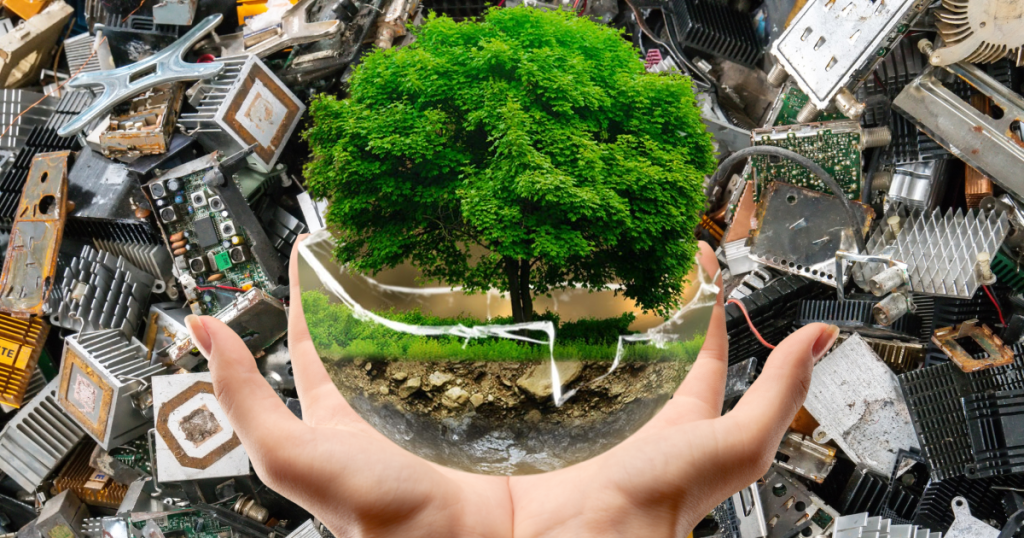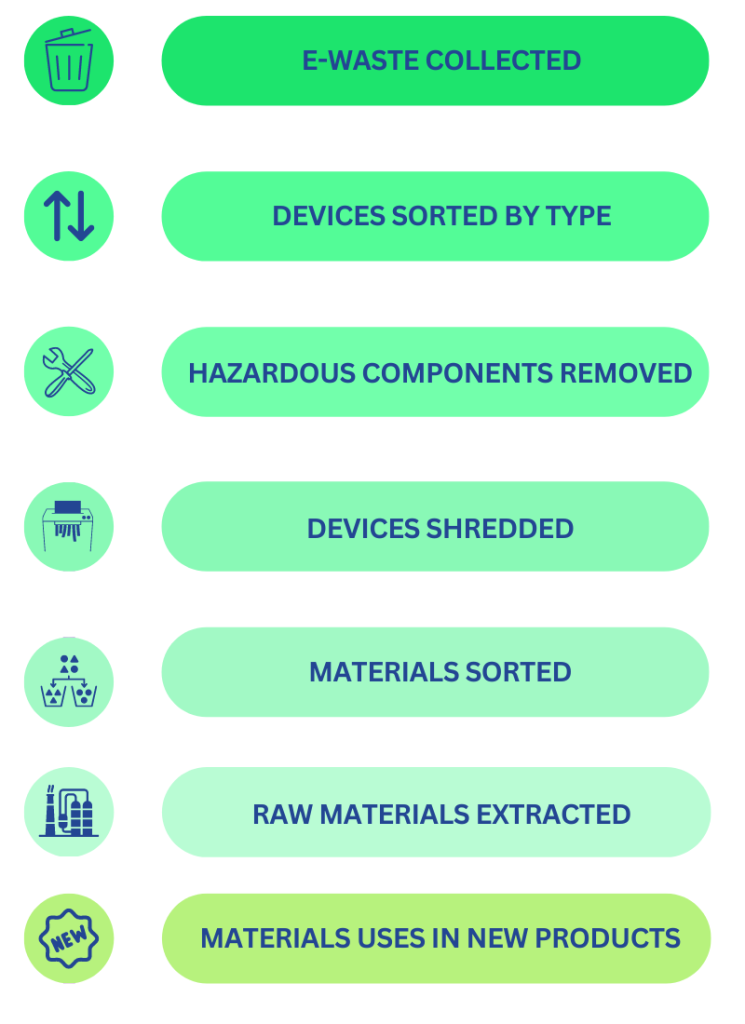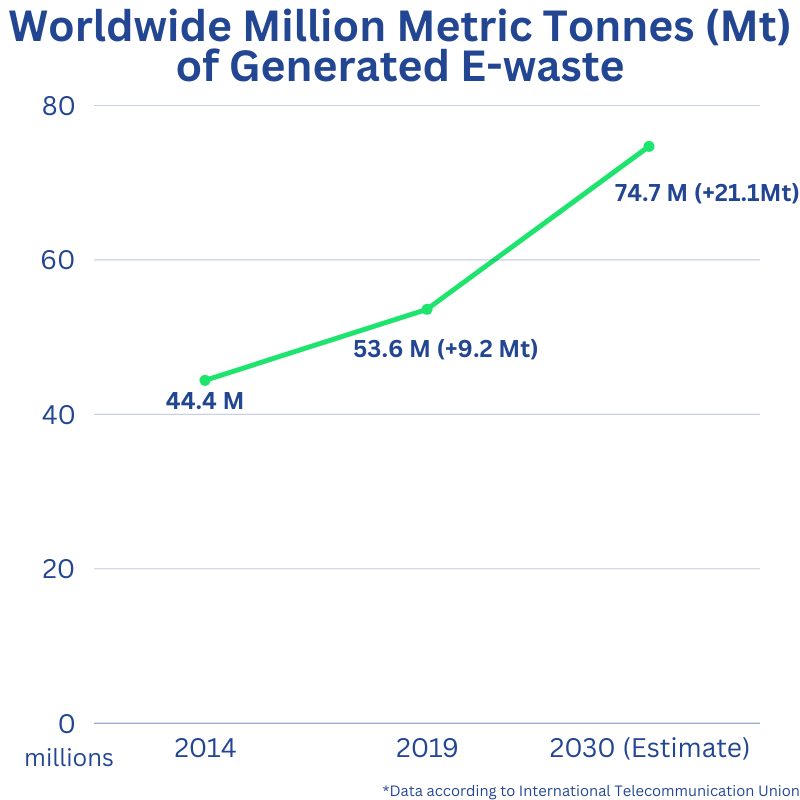
What is e-waste recycling? E-waste recycling is the process of recovering valuable materials from discarded electronic devices while safely disposing of hazardous components to minimize environmental impact.
In our rapidly advancing digital age, electronic devices have become an integral part of our daily lives. However, with technological progress comes a growing concern: electronic waste, or e-waste. The proper recycling of these discarded devices isn’t just a matter of cleanliness—it’s a crucial step in protecting our environment and conserving valuable resources. Let’s dive into the world of e-waste recycling and discover why it matters more than ever in 2024.
The Scale of the E-Waste Problem
The numbers surrounding e-waste are staggering. According to the Global E-waste Monitor 2020:
- In 2019, the world generated a whopping 53.6 million metric tons of e-waste.
- This amount is expected to reach 74 million metric tons by 2030.
- Only 17.4% of 2019’s e-waste was officially documented as properly collected and recycled.
Common Sources of E-Waste
E-waste comes from various sources, including:
- Outdated smartphones, laptops, and tablets
- Broken household appliances
- Discarded office equipment
- Old televisions and monitors
As technology continues to advance at a rapid pace, the turnover of electronic devices accelerates, contributing to this growing problem.
Environmental Impacts of Improper E-Waste Disposal
When e-waste isn’t properly recycled, it can have severe consequences for our environment:
1. Toxic Material Contamination
Many electronic devices contain hazardous materials like lead, mercury, and cadmium. When improperly disposed of, these toxins can leach into soil and water, polluting ecosystems and potentially entering the food chain.
2. Air Pollution
In some areas, e-waste is burned to recover valuable metals. This process releases toxic fumes into the air, contributing to air pollution and posing health risks to nearby communities.
3. Resource Depletion
Electronics contain valuable materials that can be reused. When devices are not recycled, it leads to unnecessary mining and production of new materials, depleting natural resources.
4. Impact on Wildlife
Improper e-waste disposal can harm wildlife through habitat destruction and direct exposure to toxic materials.
The Benefits of Proper E-Waste Recycling
Implementing effective e-waste recycling practices offers numerous benefits:
- Conservation of Natural Resources: Recycling recovers valuable materials like gold, silver, copper, and rare earth elements, reducing the need for raw material extraction.
- Reduction of Greenhouse Gas Emissions: Manufacturing new electronics from recycled materials typically requires less energy than using virgin resources, leading to lower carbon emissions.
- Prevention of Toxic Contamination: Proper recycling ensures that hazardous materials are safely handled and disposed of, protecting soil, water, and air quality.
- Economic Benefits: The e-waste recycling industry creates jobs and can be a source of valuable recovered materials for manufacturers.
Best Practices for E-Waste Recycling
To ensure your electronics are recycled responsibly:
1. Use Certified E-Waste Recyclers
Look for recyclers with R2 (Responsible Recycling) or e-Stewards certifications, such as CJD, which ensure adherence to strict environmental and social standards.
2. Understand the Recycling Process
Familiarize yourself with how electronics are recycled. Typically, the process involves:
- Collection and sorting
- Dismantling and segregation of components
- Shredding and separation of materials
- Refining and processing of recovered materials
3. Prepare Your Devices
Before recycling, remember to:
- Back up important data
- Perform a factory reset to remove personal information
- Remove batteries, which may need to be recycled separately

CJD E-Cycling’s Approach to Responsible E-Waste Management
At CJD E-Cycling, we’re committed to providing top-notch e-waste recycling services that prioritize environmental responsibility and data security. Our approach includes:
- Comprehensive Recycling Services: We accept a wide range of electronic items, from computers and TVs to networking equipment and audio/video devices.
- Secure Data Destruction: We offer certified data destruction services to protect your sensitive information.
- IT Asset Disposal (ITAD): Our ITAD services help businesses manage the entire lifecycle of their IT assets, from acquisition to disposal.
- Environmental Responsibility: We adhere to strict recycling guidelines and hold R2 certification, ensuring that we manage e-waste in an environmentally responsible manner.
Local E-Waste Recycling Solutions
For residents and businesses in the Metro East, St. Louis, and surrounding areas, CJD E-Cycling offers convenient e-waste recycling solutions:
- Drop-off Locations: Visit our Edwardsville, IL facility for easy e-waste disposal.
- Pickup Services: We provide tailored pickup services for businesses and large residential cleanouts.
- Community Events: Keep an eye out for our local e-waste collection events throughout the year.
How You Can Make a Difference
Everyone has a role to play in addressing the e-waste challenge:
- Reduce: Consider whether you really need to upgrade your devices. Often, software updates or minor repairs can extend the life of your electronics.
- Reuse: Donate working electronics to schools, charities, or individuals who can still use them.
- Recycle: When your electronics reach the end of their useful life, make sure to recycle them properly through certified recyclers like CJD E-Cycling.
- Educate: Spread awareness about the importance of e-waste recycling among your friends, family, and community.
Conclusion
E-waste recycling is more than just a trend—it’s a crucial step in protecting our environment and building a sustainable future. By understanding the impacts of e-waste and taking action to recycle electronics responsibly, we can all contribute to a cleaner, healthier planet.
Ready to recycle your old electronics? Contact CJD E-Cycling today to learn more about our services and how you can be part of the solution to the e-waste challenge.
Remember, when it comes to e-waste, your small actions can make a big difference. Let’s work together to create a more sustainable digital world!
Frequently Asked Questions
- Q: What items can be recycled as e-waste? A: Common e-waste items include computers, smartphones, TVs, printers, and household appliances with electronic components.
- Q: Is it safe to recycle devices containing personal data? A: Yes, when you use certified recyclers like CJD E-Cycling, who offer secure data destruction services to protect your information.
- Q: How often should I recycle my electronic devices? A: Recycle your devices when they no longer function or when upgrading to new technology. However, consider if an upgrade is necessary, as extending device life helps reduce e-waste.
- Q: What are the economic benefits of e-waste recycling? A: E-waste recycling creates jobs, recovers valuable materials for reuse, and reduces the need for raw material mining, contributing to a circular economy.
- Q: How can businesses implement effective e-waste recycling programs? A: Businesses can partner with certified e-waste recyclers, establish internal collection points, educate employees on proper disposal, and consider ITAD services for comprehensive management.

